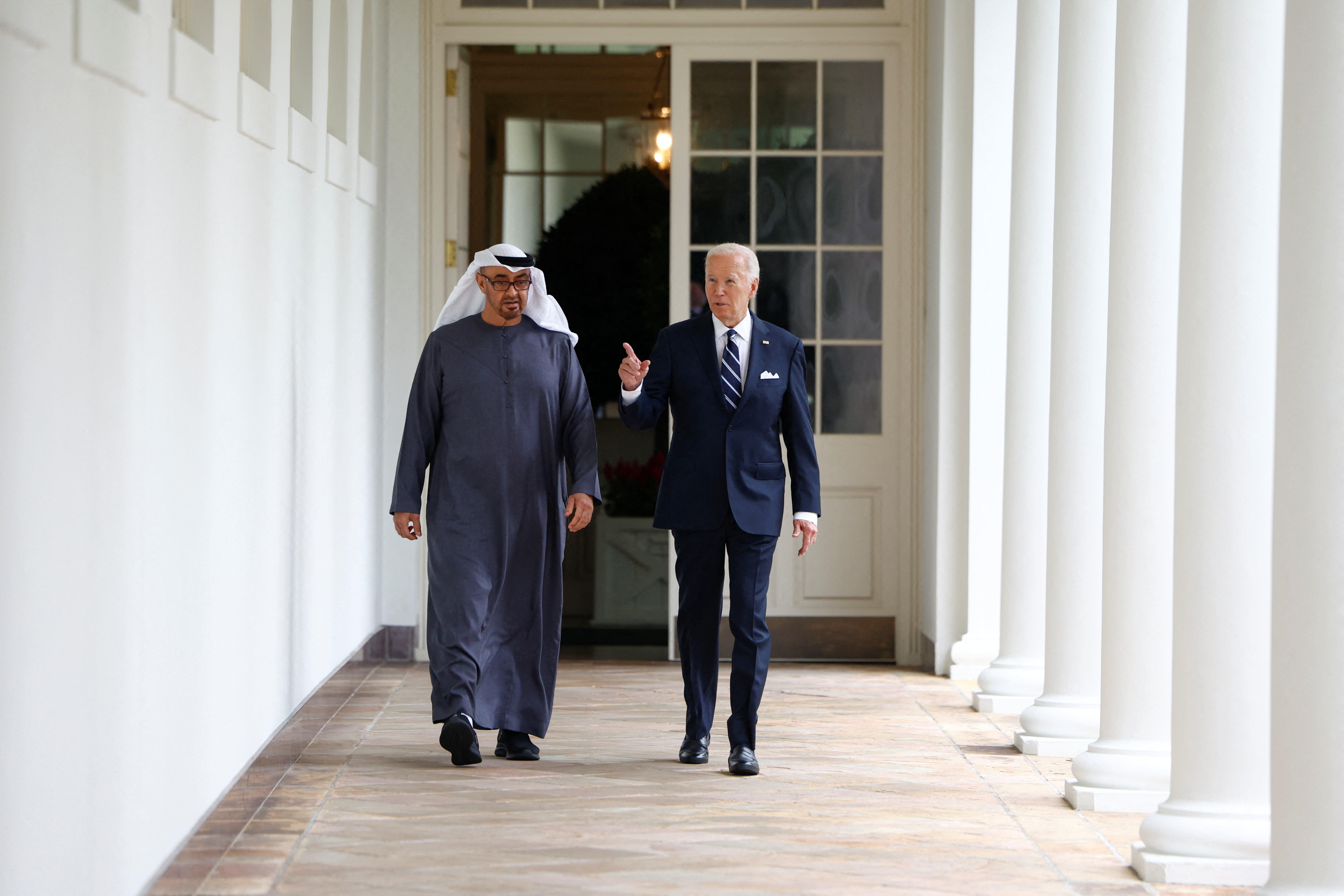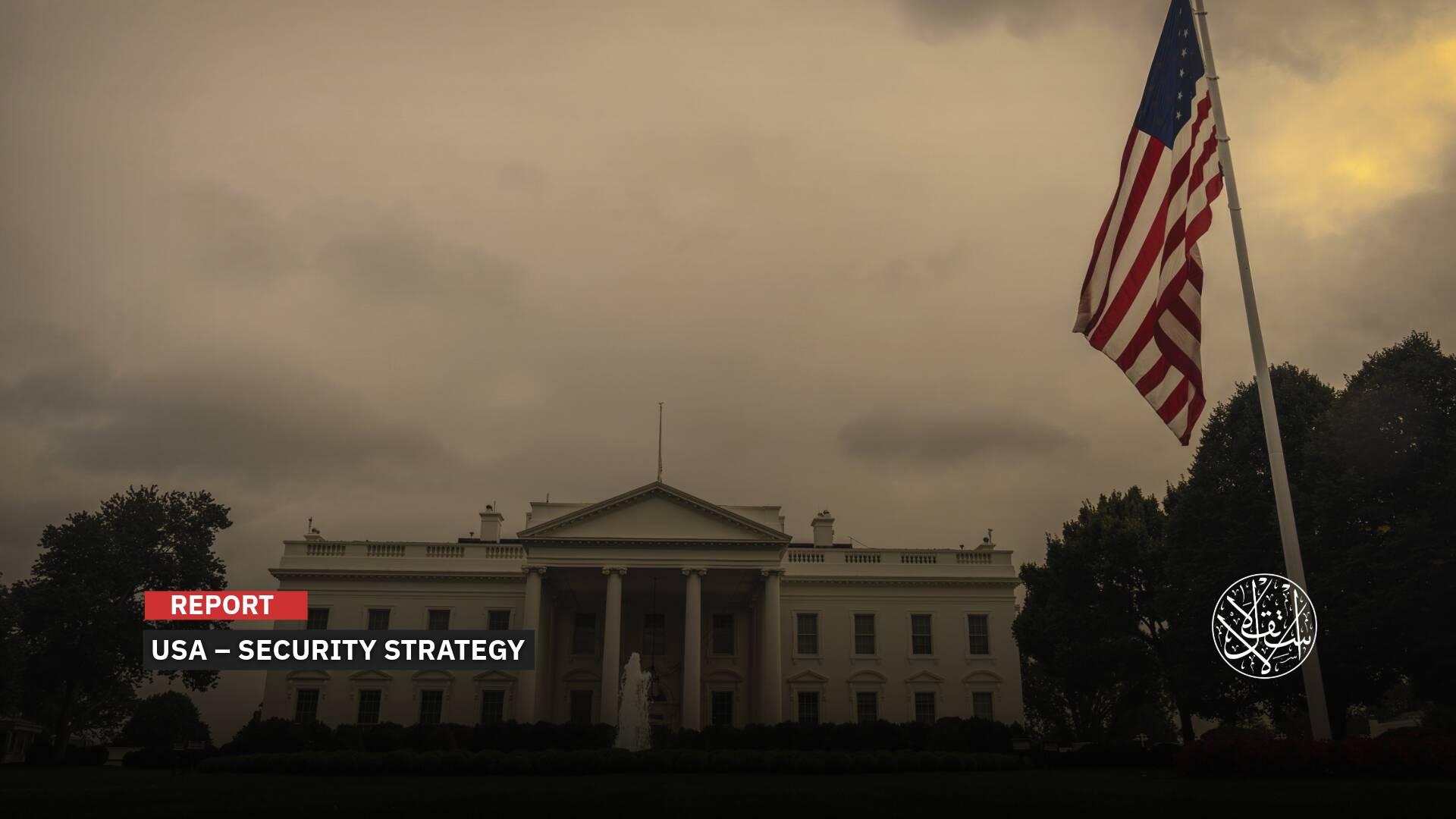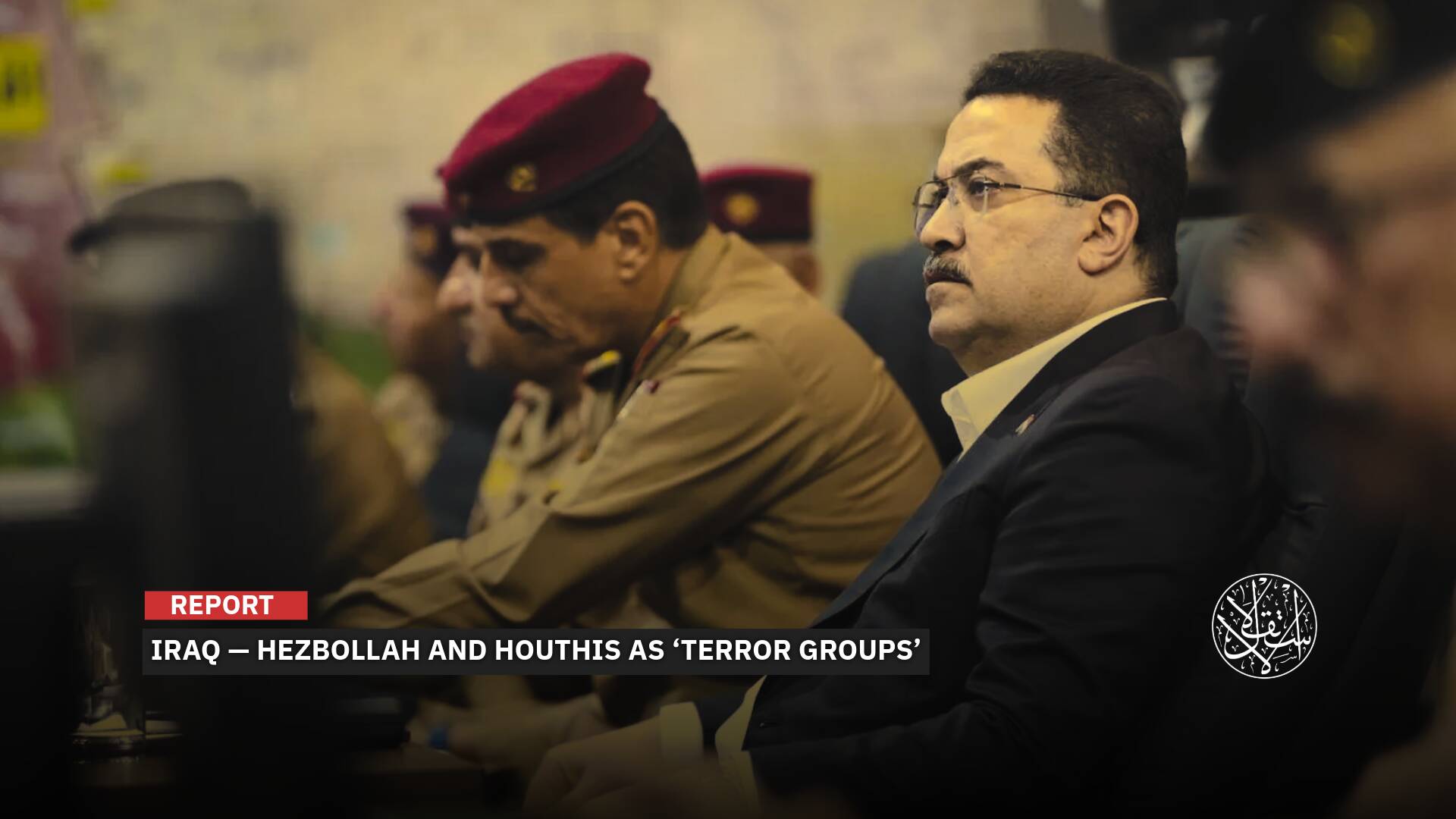Biden Names UAE 'Major Defense Partner' of the U.S.: Objectives of Both Sides?

The UAE hosts approximately 5,000 American troops at al-Dhafra Air Base.
In a historic visit since assuming the presidency of the UAE, Mohammed bin Zayed met with U.S. President Joe Biden on September 23, 2024, in Washington, where the latter designated the UAE as a “major defense partner” of the United States.
This classification facilitates deepened security partnerships and close military cooperation through joint exercises, maneuvers, and more, according to American media reports.
Washington has previously granted this designation only to India, underscoring the UAE's critical role as a U.S. ally in the region alongside “Israel,” especially following the normalization of relations between the two.
What Does ‘Defense Partner’ Mean?
“Acknowledging the U.S. and UAE’s deepening security partnership and cooperation in advanced technology and acquisition, shared interest in preventing conflict and de-escalation, President [Joe] Biden today recognized the United Arab Emirates as a Major Defense Partner of the United States, joined by only India, to further enhance defense cooperation and security in the Middle East, East Africa, and the Indian Ocean regions,” the White House announced in its statement.
With this decision, the U.S. and the UAE have become dynamic strategic partners in advanced trade and technology.
The UAE was referred to as both a major partner and a defense partner. Although this designation does not equate to a mutual defense agreement, it bestows a range of military and technical advantages upon the UAE.
The term “major partner” refers to a key ally that has established strategic working relationships with the U.S. military but is not a NATO member.
“This unique designation as a Major Defense Partner will allow for unprecedented cooperation through joint training, exercises, and military-to-military collaboration, between the military forces of the United States, the UAE, and India, as well as other common military partners, in furtherance of regional stability,” the statement said.
Designating the UAE as a major defense partner of the U.S. will emphasize “cooperation in advanced technology and investments” and “promote peace and stability across the Middle East and wider region.”
The two leaders (Mohammed bin Zayed and Joe Biden), “renewed their commitment to upholding international law, particularly international humanitarian law, work with parties to resolve conflicts and protect civilians, and to provide urgently needed aid to alleviate human suffering,” according to the same statement.
Biden affirmed that the UAE is a major defense partner for the United States, following India, aimed at bolstering defense cooperation and security in the Middle East, East Africa, and the Indian Ocean.
He expressed a strong commitment to the UAE's security and the defense of its territory, pledging to facilitate its acquisition of necessary capabilities to protect its people and land against external threats.

In a report published on September 20, 2024, the Washington Institute noted that Mohammed bin Zayed is seeking deeper security guarantees from Washington, similar to the defense negotiations between Washington and Riyadh, as well as the stalled F-35 deal since early 2021.
Alongside the White House's announcement of a permanent strategic and defense partnership between the United States and the UAE, it emphasized enhancing areas of cooperation in advanced technology and investments and strengthening their economic partnership.
In his analysis, Bilal Saab, head of US-Middle East practice at the TRENDS consulting firm, told Breaking Defense that the new arrangement “authorizes the US bureaucracy — primarily the Pentagon — to open new doors for military cooperation between the two nations in the areas of joint military exercises, training, weapons transfers, intelligence and information-sharing, interoperability, defense innovation, and defense industry.”
Notably, the White House statement addressed deepening UAE investment in U.S. defense systems and exploring potential investments in America’s most advanced defense systems.
The statement also confirmed progress made in the historic economic corridor between India, the Middle East, and Europe, IMEC, which was launched at the 2023 G20 Leaders’ Summit in New Delhi with leaders from India, Saudi Arabia, France, Germany, Italy, and the European Union.
This corridor links India to Europe through maritime and rail connections via the UAE, Saudi Arabia, Jordan, the Israeli Occupation, and Greece. It is poised to generate economic growth, stimulate new investments, enhance efficiency, reduce costs, foster economic unity, create job opportunities, lower greenhouse gas emissions, and facilitate transformative integration between Asia, Europe, and the Middle East.
The UAE hosts approximately 5,000 U.S. soldiers at al-Dhafra Air Base and provides logistical support for American forces, including refueling, reconnaissance, and other capabilities.
Still, the UAE is a founding partner in the “Abraham Accords,” which represented a significant achievement that the previous Donald Trump administration touted as a first strategic breakthrough in relations between “Israel” and its neighbors.
This positioning implies that the U.S. regards the UAE as “the second Israel” in the region to implement its plans, or merely as an investor in American defense and artificial intelligence companies requiring substantial funding.
UAE, ‘Israel,’ and India
Beyond the absolute partnership between the United States and “Israel,” which remains America’s primary ally globally, the UAE is the first country in the Middle East officially designated by Washington as a major defense partner, making it second in the world after India.
The formal announcement by the U.S. classifying the UAE as a “major defense partner” places the Gulf state on par with India, which has held this status since 2016.
This designation paves the way for increased trilateral cooperation among the U.S., UAE, and India, including joint military exercises and collaborative defense initiatives, according to India News on September 25, 2024.
Recognizing the UAE as a major defense partner signifies a gateway to military collaboration among the three nations, especially given their shared interests in the Middle East, East Africa, and the Indian Ocean.
The Indian outlet reported that this classification of the UAE is a significant step toward enhancing its military capabilities and deepening its relationships with the U.S. and India. Experts predict that the UAE will benefit from advanced American military technologies and systems, further solidifying its role as a leading power in the Gulf.

Regarding India, the same Indian source observes that this collaboration with the UAE and the U.S. as defense partners enhances India's position as a key player in global defense, increasing its significance on the world stage.
Middle East Eye noted on September 23, 2024, that the UAE's designation as a “major defense partner” reflects the U.S. desire to keep the UAE within its camp, despite tensions over its role in the Sudanese civil war, its economic links to Russia and military ties to China.
The U.S. has previously accused the UAE of “allowing Russia to sidestep US sanctions and inching closer to China militarily.” In 2023, the UAE and other Gulf states were added to a list of countries banned from freely importing advanced artificial intelligence chips made in the U.S. due to concerns about their proximity to China.
An Emirati analyst close to officials in Abu Dhabi told Middle East Eye that bin Zayed likely didn’t expect a resolution from Biden after the visit, but would like to set the tone among policymakers and officials with an eye towards a new U.S. administration after this year's elections.
The analyst said “it is with the deep state” where the UAE hoped to build trust and eventually relax restrictions.
Elizabeth Dent, a senior fellow at the Washington Institute for Near East Policy and former Pentagon official told MEE that the UAE cares about U.S. concerns over their support for the RSF [the Rapid Support Forces], and will listen to Harris’s views to see how she will handle the situation if she is elected.”
Tensions between the UAE and the U.S. emerged when Abu Dhabi accused the United States of failing to adequately defend its allies in the region, particularly after a January 2022 attack by the Houthis with missiles and drones on Abu Dhabi. In response, the Biden administration sent a destroyer and a squadron of aircraft to the UAE to deter further attacks, but Abu Dhabi deemed the American response insufficient.
Partner in Sudan Crimes
It was a curious irony that the discussions between Biden and bin Zayed did not address the crimes of the Abu Dhabi regime in Sudan and its support for the Rapid Support Forces (RSF) led by Mohamed Hamdan Dagalo (Hemedti). This occurred despite American reports highlighting the UAE's involvement in escalating the situation in Sudan and spreading chaos by supporting the rebel forces.
In contrast, a separate meeting took place between bin Zayed and Vice President Kamala Harris, the presidential candidate, during which she implicitly criticized the UAE's role in the escalation in Sudan. Harris had previously confronted President bin Zayed regarding his country’s support for the RSF when they met in December 2023, according to informed sources speaking to The New York Times.
After Harris raised American objections to arms smuggling with UAE President bin Zayed in December, the latter reportedly offered what some officials viewed as an implicit acknowledgment. Bin Zayed stated that he “viewed the RSF as a bulwark against Islamist political movements in the region, which the Emirati royal family has long considered a threat to its authority,” according to officials.
The UAE’s designation as a partner, despite criticism for igniting the war in Sudan, suggests that the U.S. concerns about the Sudanese conflict and its claims of seeking “peace” are not serious, according to Sudanese sources for Al-Estiklal. They asserted that what the U.S. is doing through the partnership with Abu Dhabi “is nothing but a political ploy to distract from failures in American foreign policy in Africa.”
Two days before the partnership agreement, the New York Times (NYT) reported on September 21, 2024, that the UAE “is expanding a covert campaign to back a winner in Sudan’s civil war. Waving the banner of the Red Crescent, it is also smuggling weapons and deploying drones.”
The report stated that the gulf state is playing a deadly double game in Sudan, presenting itself as interested in stopping the war while simultaneously supporting the RSF against the Sudanese army.
“All the while, the Emirates is presenting itself as a champion of peace, diplomacy and international aid. It is even using one of the world’s most famous relief symbols — the Red Crescent, the counterpart of the Red Cross — as a cover for its secret operation to fly drones into Sudan and smuggle weapons to fighters, satellite images show and American officials say,” as per NYT.
Regarding the conflict in Sudan, the White House statement noted that both Biden and bin Zayed “expressed their deep concern over the tragic impact the violence has had on the Sudanese people and on neighboring countries. Both leaders expressed alarm at the millions of individuals who have been displaced by the war, the hundreds of thousands experiencing famine, and the atrocities committed by the belligerents against the civilian population.”
They stressed that there can be “no military solution to the conflict in Sudan” and urged “concrete and immediate action to achieve a lasting cessation of hostilities, the return to the political process, and transition to civilian-led governance,” as mentioned in the statement.
A Times investigation last year uncovered an Emirati weapons smuggling operation, which was confirmed in January by U.N. investigators citing "credible" evidence that the Emirates had violated a two-decade U.N. arms embargo on Sudan.
The report clarified that the Emiratis are now working to increase support for the RSF militia with weapons, some of which are advanced, such as Chinese drones being smuggled to Hemedti from a military airport in Chad that the UAE has expanded.
American officials indicate that the Emiratis are now using the airport to operate advanced military drones to provide the RSF with intelligence on the battlefield and to escort shipments of weapons to fighters in Sudan to monitor ambushes.
On September 25, 2024, the UAE announced the deaths of four of its soldiers and injuries to ten others while “performing their duty within the country,” without specifying when and where this occurred or the reasons behind it.
However, Sudanese sources speculated that the Emirati military personnel were killed and injured in Sudan during an airstrike conducted by the Sudanese air force on Nyala Airport on September 24, 2024.
Sources
- Biden designates UAE as a second major defense partner after India
- US names UAE major defence partner as Middle East tensions soar
- How a U.S. Ally Uses Aid as a Cover in War
- UAE designation as US Major Defense Partner to tighten security ties, could aid F-35 deal: Experts
- The United States and the UAE Look to Military Cooperation with India After Designation as Major Defense Partner [Arabic]
- MbZ Visits Washington: Meeting Agendas and Regional Implications
- Joint Statement by the U.S. and UAE Leaders on the Vital Strategic Partnership Between the Two Nations [Arabic]
- U.S.-UAE Joint Leaders’ Statement Dynamic Strategic Partners













